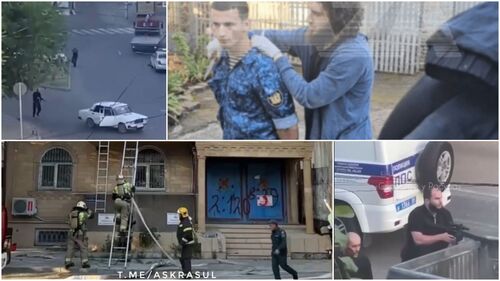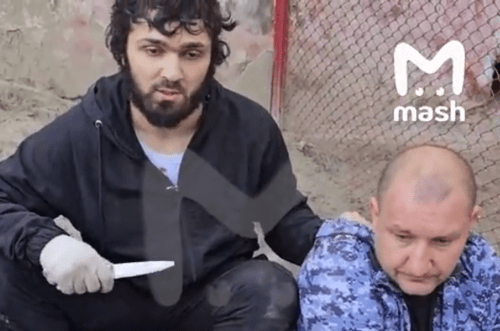
Terrorist attack in Rostov Detention Center and Dagestan
Over eight days in June 2024, terrorist attacks with a religious undertone occurred in two regions of southern Russia: the Rostov region and Dagestan. The hostage-takers in the Rostov detention center immediately identified themselves as followers of the banned “Islamic State” in Russia. The attackers on the Orthodox church and two synagogues in Dagestan have not made such a statement, but the targets they chose indicate a religious motive. “Caucasian Knot” has prepared an analysis comparing the methods of the attacks in the Rostov detention center and Dagestan.
Hostage-taking in Rostov Detention Center

On June 16, 2024, detainees in Detention Center No. 1 in Rostov-on-Don took two staff members hostage.
The hostage-takers immediately declared themselves members of the banned terrorist organization “Islamic State” in Russia. They recorded two video messages with their demands and posted them online. In footage published by the Telegram channel “112,” one of the captors stated that Islamic State members had taken over the “Rostov central,” where their “brothers” were being held. The video showed the Islamic State flag and headbands with Arabic script on the prisoners. Many commentators noted the long beards of the hostage-takers.
The mufti of the Rostov region, Akhmed Abusupyanov, came to negotiate with the hostage-takers. According to him, when he entered the facility, three prisoners with a hostage came to meet him. They did not respond to his request to release the hostages, which he described as “futile.”
The raid began after the mufti left the detention center. Five militants were killed, one was injured and sent to intensive care in critical condition. Both hostages were freed.
Three of the hostage-takers—Shamil Akiev, Tamerlan Gireev, and Azamat Tsitskiev—joined the Islamic State in April 2022 and planned an attack on the Supreme Court of Karachay-Cherkessia using an improvised explosive device. In 2023, they were sentenced to long prison terms.
The Investigative Committee of Russia opened a criminal case regarding the hostage-taking. According to the investigation, the hostage situation in Detention Center No. 1 in Rostov-on-Don had been planned for several months, and the hostage-takers’ actions were coordinated from outside.
Attacks on religious sites in Dagestan
Just over a week after the events in the Rostov detention center, on June 23, 2024, militants in Dagestan attacked an Orthodox church, two synagogues, and law enforcement officers. The attackers have not yet declared themselves supporters of the “Islamic State,” but their actions were clearly directed at non-Muslim religious buildings.
According to the Investigative Committee, 19 people were killed in the attack: 15 police officers and four civilians. Five militants were also killed. Later, the Ministry of Health reported that the death toll had risen to 20, with 46 injured.
The attacks on the church and synagogues in Makhachkala and Derbent began almost simultaneously. Initial reports of gunfire came from Derbent. The Dagestan Ministry of Internal Affairs reported that unknown individuals “fired at a synagogue and a church with automatic weapons” in Derbent.
It was later revealed that during the attack on the Church of the Intercession of the Holy Virgin in Derbent, the assailants entered the church, shot the security guard, and killed a 66-year-old Orthodox priest. The attack occurred on one of the main Christian holidays, the Day of the Holy Trinity (Pentecost), which is celebrated by Orthodox Christians in Russia.
The attack on the synagogue in Derbent took place around 5:50 PM, 40 minutes before the evening prayer. A large fire broke out in the synagogue building. Around the same time, an attack was carried out on a synagogue in Makhachkala. The attackers left references to surahs and ayats from the Quran on the synagogue gates. Nearby, on Yermoshkina Street, there was a shootout between militants and police. The Holy Assumption Cathedral also came under fire, where 19 people took shelter after the shooting began.
Around 10 PM, in the center of the village of Sergokala, located 80 kilometers from Derbent, unknown individuals shot at a car with police officers, injuring one Ministry of Internal Affairs officer.
Two sons and a nephew of the head of the Sergokala district in Dagestan, Magomed Omarov, were found to be involved in the attacks in Derbent and Makhachkala and were killed. Omarov himself was detained, and his house was searched.
The National Anti-Terrorism Committee (NAC) declared a counter-terrorism operation (CTO) regime in Dagestan on June 23. Around 8:00 AM Moscow time on June 24, the CTO regime was lifted.
The Investigative Committee of Russia has opened a criminal case under the article on terrorism.
Expert opinions
The inscriptions left on the synagogue door in Derbent—“2:120” and “8:39”—refer to the 120th verse of the second surah of the Quran and the 39th verse of the eighth surah, according to the author of the Telegram channel “Ask Rasul.”
Experts interviewed by “Caucasian Knot” noted that extremists interpret these verses of the Quran to justify opposition to Jews and Christians. They also suggested that the date of the attack on the church—June 23—was chosen by the militants because it coincided with the Christian holiday of Pentecost, which marks the end of the Easter period. This date in Christianity commemorates the descent of the Holy Spirit upon the apostles and the founding of the Christian Church.
Experts from the American Institute for the Study of War concluded that the Dagestan attacks were likely carried out by the Caucasus cell of the “Islamic State”—”Wilayah al-Qawqaz,” which previously claimed responsibility for the terrorist attack at “Crocus City Hall” in Krasnogorsk, Moscow region.
